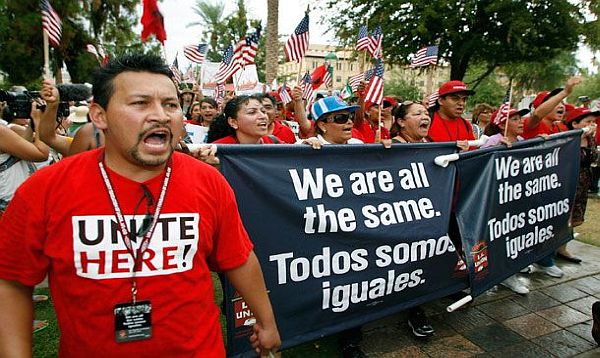Mexico City, Mexico - Mention Arizona and many Mexicans grimace.
It's still widely viewed as the most anti-Mexico state in the US, even if the tough anti-migrant law behind that perception has been largely voided. But Arizona's leaders are logging lots of miles to put a new face on their home state.
Official delegations have come across the border several times in the last year looking to drum up more trade and tourism in what is already a big business relationship — but one they say could be much bigger. They're talking binational everything: companies with headquarters in Phoenix and factories in Mexico, wine tours that visit both sides of the border, even the first Super Bowl with Mexican sponsorship when Phoenix hosts the mega-sports event next year.
"We're just like you are," said Arizona House Speaker Andy Tobin, who voted for Arizona's controversial law. He was speaking to a binational cocktail party in Mexico City this week, saying Mexicans and Arizonans want the same future for their children: "We'll be here a lot more frequently, and we're here to continue to make friends."
"Friends" was the furthest term from mind in 2010, when the Arizona legislature made it a state crime to fail to get or carry immigration registration papers — a provision that was later thrown out by the US Supreme Court. Justices upheld the law's provision that police, while investigating other crimes, are required to question people's immigration status if they're believed to be in the country illegally.
Drawing cries of racial profiling, the law sparked international protests and calls for boycotts of Arizona. It was loudly condemned by then-Mexican President Felipe Calderon, and US President Barack Obama called it misguided.
Though it was largely gutted, the impact on the state's image was lasting.
"Arizona has a stigma, just like Ciudad Juarez has a stigma," said Rafael Fernandez de Castro, a Mexican academic and government adviser, referring to the Mexican border city known worldwide for drug-related violence, even though its homicide rate has dropped.
Tobin, who was leading his second delegation in six months and plans to be back in June, said he supported the legislation because "we were in a crisis mode."
What Changed?
The global economy.
Arizona emerged from severe recession and recognized it sits next to a country that has lured manufacturing back from Asia, is aggressively seeking foreign investment and plans to open its rich oil sector to the rest of the world. Not only that, Texas and California were already far ahead in boosting economic ties with the "new Brazil."
Other state delegations arrive regularly, with Utah coming in April and Massachusetts' governor stopping in Mexico City at the same time as the Arizona delegation.
"We have changed our economic policies and now we can show on paper that investors here in Mexico City will find Arizona is a better investment than Los Angeles or Austin," Tobin said.
 |
"My message is that 1070 doesn't reflect the values of the people of Phoenix," said Stanton, who wants to double his city's exports to Mexico in the next five years. "Mexico in the next 20 to 30 years is going to be one of the top economies in the world, passing up Brazil. If we don't get this right now, we're going to miss out on a massive opportunity."
Mexicans are already Arizona's biggest foreign trade partners, with the state exporting $7 billion worth of goods last year, the US Commerce Department says. But that's way behind Texas at $100 billion and California at $24 billion.
Mexican visitors to Arizona spend an average of $7 million a day, according to the Arizona-Mexico Commission, a nonprofit group that promotes economic ties.
Members of the Arizona delegation were quick to note that state Sen. Russell Pearce, who sponsored the immigrant legislation, has since been voted out of office.
David Farca of the Arizona Super Bowl Host Committee, who came on the trade mission, said the anti-immigrant law was never implemented as written, but that wasn't widely noticed. "There's a complete misconception about that," he said. "On the other hand, there's a perception from Arizona that if you come to Mexico City, you're going to get kidnapped. Yet here we are. So perception is not everything."
Original Story


